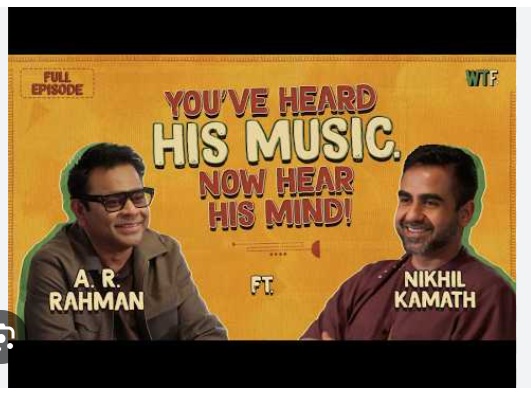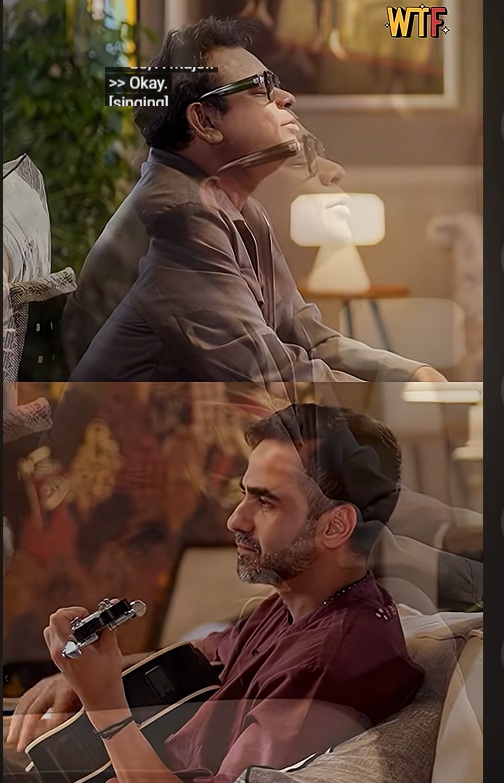AR Rahman believes AI should focus on tasks beyond human capacity, not replace human skills; One of India’s most celebrated composers and global cultural icons Rahman Opens Up on Loss, Faith, AI, and the Future of Indian Music on People by WTF with Nikhil Kamath

FinTech BizNews Service
Mumbai, November 20, 2025: In a deeply introspective and wide-ranging episode of People by WTF, A.R. Rahman, one of India’s most celebrated composers and global cultural icons, sits down with Nikhil Kamath for an unfiltered conversation offering a rare insight into Rahman’s worldview.

Beyond the accolades and global recognition, this episode quietly reveals Rahman’s softer, humbler, and remarkably down-to-earth self, reflecting a man driven more by sincerity and spirituality than by fame. Over a candid chat, Nikhil and A.R. Rahman discuss Rahman’s journey, spanning loss, growing into a global musical legend, faith, creativity, AI, and the future of Indian music and entertainment.
This conversation will particularly resonate with young entrepreneurs in India’s
creative and live entertainment sectors, aspiring musicians balancing art, faith, and
success, technology innovators exploring AI’s role in creativity, and students or
professionals seeking purpose, self-belief, and reinvention.

Key conversations include:
1. On Loss, Grief And Finding Solace In Music: Nikhil Kamath opens the
conversation by exploring A.R. Rahman’s early years in Chennai and Bangalore, and
how those experiences shaped his worldview and music.
Rahman revisits his early childhood, marked by the loss of his father,
grandmother, and emotional upheaval. “Every day I used to wake up to that.” He
credits his mother for anchoring him during those turbulent years and
encouraging him to hone his musical skills. “My mother took all the pain. She
protected us from, and she was so strong that withstanding all the kind of
humiliations, she single-handedly brought us up and encouraged me to go into
music.”
Working in studios from a young age, Rahman describes how the console
became his classroom. “My whole childhood was with 40-year-old and 50-year-
old and 60-year-old in the studio playing music. And I missed all the fun with friends
and all that stuff at school. No college.”
2. Roja: The Turning Point: Nikhil turns to the moment of transformation and asks
how Rahman’s journey into becoming a musical legend truly began, adding with a
smile, “I am such a big fan… your song Tu Hi Re, I think I must have heard that song
through so many heartbreaks and falling in love.”
Rahman reflects on Roja and how it became the defining project of his life. “Roja
changed everything.” He reveals that during the film, he was actually on the verge of
walking away from movies altogether. “This will be my last movie,”he remembers
thinking. His instinct to step away came from a desire to remain selective and
protect his creative integrity, a sensitivity shaped by watching how the industry
once “consumed” his father.
He recalls telling Mani Ratnam “I am very satisfied working with you. I don’t want to
work with other people. I’ll just do jingles or private albums.” Mani gently pushed back:
“No, you should work with everyone.” Rahman laughs about it now, admitting that for
the first ten years he still felt, “Okay, enough.”
3. Beyond Success: Living Simply: When asked if he ever felt impostor
syndrome, A.R. Rahman admits, “Always. That’s why I surrender.” Recalling the
early days of his career, Rahman says, “When I was doing Roja, I didn’t have money
for even putting petrol.” For him, living simply isn’t a constraint but a philosophy.
“Your lifestyle, even whether you have money or not, can be the same. You can travel,
you can eat anywhere you want, but you don’t want to show the whole world what you
are. And then it’s a fake pompousness.”
4. From Tradition to Global Sound: When asked about the change in India’s musical
landscape during his rise, A.R. Rahman explains that before Roja, “There was a
traditional kind of music, which is beautiful. And there’s a beauty in it still. Because I’m
not made of that. My sensibility was different.” This eclectic taste made him want to
move beyond the formulaic sound of the time.
Describing the turning point with Roja, Rahman says his goal was to make Indian
music global. He deliberately slowed his pace to focus on quality and innovation
sharing, “Each Tamil song I do, should go around the world. And it was planned. I
worked for it. That’s why I did less work… I need time to heal, I need time to listen to it,
I need time to change, I need to evolve a song.”
5. AI Won’t Replace Artists, It’ll Redefine Them: As the conversation drifts toward
the future, Nikhil Kamath brings up the inevitable question: How does artificial
intelligence change the meaning of creativity?
Nikhil opines, “Creativity will become more relevant in the world of AI.” Rahman
agrees and further adds, “It’s a very empowering tool for younger people who don’t
have the access to make a movie or make art or they don’t know how to paint but they
have a vision.” He notes that AI will also push artists to evolve. “You have to be
contrarian to whatever the predictive model is.” Rahman says.
6 Don’t make people lose jobs: Rahman emphasizes that his first message to every
AI leader is ethical. “Don’t make people lose jobs. Empower people to remove the curses
of generational poverty, misinformation, and lack of tools to create.” He believes AI should
focus on tasks beyond human capacity, not replace human skills, and sees art as a crucial
space for preserving humanity’s role.
7. Rahman’s Rules for a Creative Life: A.R. Rahman shares a deeply personal
reflection on persistence, growth, and the evolving nature of art. “First you get mud,
then you get water, then you get petrol, then you get gold, but you have to keep
digging.”
He recalls how his own musical journey has always been one of self-discovery
through constant practice and humility. “Just don’t think negative stuff. Don’t worry
about anything. Nobody cares. We’re all going to die one day.” He admits he never
thought of himself as gifted: “When I was young, I felt I was very bad at music.” What
made the difference was persistence and mentorship.
8. AI will hurt musicians: A.R. Rahman’s upcoming project “Secret Mountain”
embodies his vision of blending technology and humanity. Looking ahead, he
says, “I am looking forward to the success of Secret Mountain. If it deserves, we
want to create something extraordinary from India to the world. Because we put
three years of our life in it, we want to make this the most significant entity from
India to the world.”
While he admits “AI in music will hurt musicians,” Rahman insists it can’t
replace “the human way - passing on the spirit of music to a student.” For him, “live
concerts, live dance, live musical theatre, symphonies will be respected even
more.”
9. On Sincerity, Loss. Finding peace in Faith and the Spirit of Music:When
asked about his personal life and inner world, A.R. Rahman shares, “All the
scary things have already happened in my life my father’s death, my
grandmother’s death, my mother’s death. It made me like completely numb, it
made me zen mode, it made me believe that everybody is going to die.”
Through that realization, he found detachment.
When Nikhil compares Rahman to a God of music, Rahman very humbly
laughs saying, “I am not God, I am a servant. It just takes one second for
people to completely turn the coin so I don't take it seriously I am sincere to
what I believe in.” For him, peace comes from faith. “If you believe in God,
every breath is a blessing to me, every opportunity is a blessing to me. When
I perform, I feel like it’s a shrine, we are all enjoying the fruits of oneness in a
stadium. Sincerity is very important. If I am not sincere in my music, I am not
sincere to myself.” For Rahman, spirituality and art are inseparable. His faith
led him to sufism which he describes as the journey of self-discovery
through surrender. “The simple thing is to discover yourself.” Additionally,
for him, kindness itself is worship. He says, “Smiling at someone is the
biggest charity, if you don’t have money to give, you smile at them.”
10. Reinventing Cinema for Future India: Rahman remains hopeful about the
future of movies but believes the industry must evolve to survive. “The movie
theatre business is not going anywhere. It is going to stay. But it should be
reinvented,” he says. For him, the next phase lies in immersive storytelling.
Rahman’s message is clear: “You have a right to have proper infrastructure.
It’s very important there should be enough places which bring hope.” With
conviction, he adds, “Our country is now prosperous enough. This is for
future India, for our youth, for our children to experience all this.”
11. Beyond the Oscars: Success and Solitude: Rahman reflects on what winning
international awards like the Oscars and Golden Globes actually feels like from the
inside. The glamour, he explains, is mostly perception. He recalls watching the
attention grow as Slumdog Millionaire gained momentum. “Nobody called me at first,
then there was the Golden Globe - three people called. Then the next one is Oscar, a
hundred people calling your name. I could see the whole evolution of how famous that
movie and the music and you are all becoming.”
Rahman admits that constant travel and public attention drain him, making it
difficult to maintain friendships and family life. “There’s no time. Even to spend
time with family, I have to make sure I pull them for dinner or something. They all have
their own lives.” His closest relationships, he says, are with the people he collaborates
with, “All the directors are my friends. I never treat it like work.”
12. Rahman’s Call to India’s Dreamers: When asked what kind of businesses young
entrepreneurs in India could build in the live entertainment space, A.R. Rahman
advises them to “find the void.” He points out that creative industries in India: from
design to technology, are still brimming with untapped potential.Within entertainment,
Rahman believes musical theatre and state orchestras are India’s next frontiers.
“Having an orchestra in every state is very important, having a world-class, changing
entertainment,” he says. On a personal front, he says, “If you think about the world,
what’s going to happen to the world, you miss what’s going to happen to your family. If
you look after your family, the world will take care of itself.”
People by WTF is a compelling series where Nikhil Kamath engages in candid,
thought-provoking conversations with trailblazers from diverse industries across
the globe. From business and technology to sports, entertainment, and policy, each episode
offers rare insights into the minds of those redefining success. Through deep dives into pivotal
moments, hard-earned lessons, and bold perspectives, People by WTF challenges conventional
thinking and inspires audiences to push boundaries. This podcast is your gateway to transformative ideas,
whether you're a business leader, entrepreneur, or someone eager to refine your skill
set. Past guests include Indian Prime Minister Narendra Modi, Bill Gates, Nandan
Nilekani, Ranbir Kapoor, and Kumar Mangalam Birla.